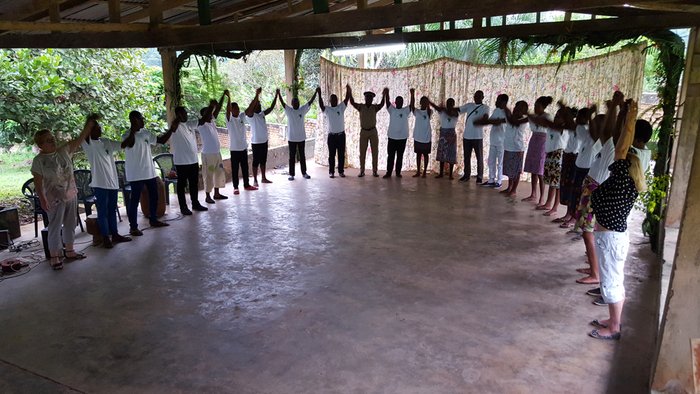
In September 1990, PEA was founded as an NGO to mobilize and empower the adolescents living in Togo. It aims to educate people in non-violence and to prevent both conflict between ethnicities as well religious radicalisation. In addition, it strives for the social and professional integration of young people. Two members of the Board of Trustees of the Threshold Foundation have known the project and its initiator, Pastor Franck Adubra, from the very beginning.
Above all, PEA provides the opportunity for young people to exchange ideas during regular meetings in Kpalime and to discuss current topics. For example, young people can inform other young people by means of billboard campaigns and radio programmes. Moreover, PEA follows its social vocation by supporting unemployed adolescents to find professional orientation as well as paying the school fees for individual children from poor families or orphans. It also accompanies and promotes self-help projects initiated by young people by providing tools for craftspeople.
The PEA has its own centre for encounter, the “Mini-Village of Hope” in Agome-Tomegbe, close to Kpalime, the main town in the prefecture of Kloto, which is situated approximately 120 km north of the capital city of Lome. Seminars, interreligious and intercultural encounters and workcamps involving adolescents from all religions and social backgrounds are organised here and in two other places.
For the 30-40 participants, the workcamps are the first opportunity to meet people from different religious or ethnic backgrounds and with different political convictions. A focus on human rights, the rights and duties in a democratic state and the recent and ancient history of Togo provide the basis upon which to sensitise individuals for non-violent conflict resolution as well as for ethical and religious-based reconciliation.
Culturally adapted methods such as dance, music, theatre and participatory methods of non-violent communication and conflict resolution are used for this educational purpose. The young people are then supported in their role as multipliers for non-violence and reconciliation within their own specific environment.
Togo is a relatively small country in the Gulf of Guinea with a population of about 7.8 million from very many different ethnic and language groups. It is estimated that approximately 2 million Togolese have left their country for political or economic reasons. With an annual GDP of 572€ per capita, Togo is one of the poorest countries in the world.
For three decades, the country was under a repressive, autocratic rule characterised by a dictatorial one-party system and supported by a quasi-ethnic army. Since the 1990s, an increasingly strong opposition movement has been calling for a democratic, constitutional multi-party system. However, despite its initial success, for the past 25 years the country has found itself in an ongoing crisis marked by the confrontation between the ruling powers and the opposition party.
The young people in Togo play a significant role in terms of political mobilisation; however, they are also misused, and sometimes radicalised, by protagonists from different sides to serve their own purposes. They count the largest number of victims of violence at demonstrations.
The young rural population not only make a substantial contribution to the food production for their own consumption but also to the production of market culture goods such a cotton. The increasing fluctuations in the normal weather cycle make it difficult to have a secure income.
The political unrest has frequently resulted in limited access to regular school education and vocational training, which in turn has led to impoverishment and a loss of social and ethnic orientation. The COVID-19 pandemic has further aggravated this situation. This results in unemployment, working under precarious and informal conditions, further impoverishment, and a lack of perspective.